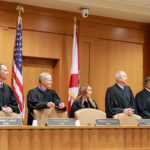He’s One of Miami’s Brightest Developers. A Trio of Lawsuits Suggests a Darker Side
Edgardo Defortuna has been flying high for years, hiring star architects and erecting a string of ultra-luxury condo and hotel towers on his way to becoming one of Miami’s most prominent developers. He recently announced his first foray outside South Florida, unveiling a design for a trio of luxury towers in Paraguay.
But three separate lawsuits against Defortuna and his Fortune International Group suggests there may be a dark side to the Argentine-born developer’s success story. The complainants contend Defortuna has engaged in a series of dirty tricks, cheating small investors and lenders in one of his signature projects, and blocking the sale of a small condo next to another project through subterfuge to thwart potential competition.
In the first lawsuit, three plaintiffs — Spartan Lending, Capital Building and Florida Beach Investment — allege Defortuna falsely claimed a massive loss on his $200 million Jade Ocean luxury tower in Sunny Isles Beach while awarding inflated fees to corporate affiliates he controlled, essentially paying himself at the plaintiffs’ expense.
On Monday, barring a last-minute settlement, a Miami-Dade Circuit Court judge will rule whether the plaintiffs’ complaints should move forward to an immediate trial.
In court pleadings, Defortuna and his attorneys have denied those claims.
”This lawsuit is completely without merit and I look forward to the date that the court dismisses these false and unsubstantiated claims, once and for all,” Defortuna said in an email statement to the Herald.
But the plaintiffs have already made a little headway in the case. On Dec. 4, Judge William Thomas ruled in favor of Spartan and Capital on some of their claims, finding that they are entitled to repayment of their respective $250,000 loans to the Jade project, along with 18 percent interest, collection costs and attorney fees.
“We are pleased that Judge Thomas ruled that Fortune Ocean must repay the outstanding loans with interest and attorneys’ fees,” said Jennifer Recine, a partner with Kasowitz Benson Torres, the firm representing Spartan, Capital and Florida Beach. “The trial will focus on the fact that — crash or no crash — Edgardo Defortuna looted millions of dollars of investors’ funds from the Jade Ocean Project by paying his own companies grossly above market rates or paying them for services they never provided.”

The plaintiffs’ contention in that long-running suit is echoed by a separate complaint filed by a fourth Jade Ocean lender. Iver Invest and Trade says Defortuna stopped payments on a $2 million loan and still owes $1.5 million plus interest accrued over 10 years.
“My client was paid about $500,000, then was told there’s no more money,” said Iver’s attorney, Wayne Atkins of the Xander Law Group. “A lot of people lost money, but the Fortune companies were still getting paid.”
Fortune’s attorneys at the Coconut Grove law firm Coffey Burlington have asked the judge to dismiss Iver’s compaint, arguing the lender waited too long to sue and legal time limitations have expired. A hearing on the dismissal motion is scheduled for January.
A third lawsuit
A third lawsuit is scheduled for trial in February. The case involves the Ritz-Carlton residential tower in Sunny Isles, which Defortuna developed in partnership with the Chateau Group and its principal, Manuel Grosskopf, who are also defendants in the suit.
Defortuna and Grosskopf are being sued by the association of the Tropicana Condo, an older, much smaller building immediately to the south. The gist of the condo owners’ complaint: That the developers put up straw buyers to purchase five units in the Tropicana, enough to vote against and thus thwart a deal to sell the 48-unit condo to another developer for $115 million, said the association’s attorney, Glen Waldman.
Waldman said he believes Defortuna and Grosskopf had the units purchased as a preemptive move because they were promising buyers of upper-floor condos at the 52-story Ritz-Carlton an unusual perk: unimpeded beach and ocean views to the south in perpetuity.
A developer who bought the Tropicana would have the right to build 50 stories, blocking those promised views, Waldman said.
Buying the units through fronts is legal. But Waldman said it was a dirty deal for the Tropicana’s mostly older and retired owners, who would have each cleared around $2 million for their units in a sale of the condo.
“It was a smart, calculated way to protect their substantial investment, to the detriment of forty-some unit owners who stood to have enough money to retire and live on for the rest of their lives,” Waldman said.
Defortuna and Grosskopf have been aggressive in asserting their rights at the Tropicana, the lawsuit claims.
The Tropicana association had in recent years changed its condo by-laws to remove a requirement for a unanimous vote of all owners to sell the property, and to limit the number of units owned by a single entity to two.
The purported straw buyers sued to overturn the new rules, eventually winning a split decision at the Third District Court of Appeal.
Under the rules reinstated by the appellate decision, their five votes are enough to block a sale. But the association counter-sued in June, claiming all five units are in effect owned by the same party, the Defortuna-Grosskopf joint venture. None of the five units is permanently occupied.
The attorney for the five purported unit owners, John Shubin, has asked the judge to dismiss the case.
“This case was litigated very extensively before, and we prevailed on all the significant issues,” Shubin said. “We are confident we will prevail again.”
Monday hearing
In the suit set for trial on Monday, the three plaintiffs contend Defortuna engaged in “a large-scale real estate fraud” after inviting them to invest in the Jade Ocean project at 17121 Collins Avenue in 2004. They say Defortuna “siphoned off” money from the project between 2004 and 2012 through a network of affiliates while stiffing them for “every dollar” they had invested.
The suit alleges Defortuna’s accountants at Coral Gables-based HLB Gravier produced an intentionally misleading audit and “bogus” financial reports showing the project lost nearly $63 million, while the plaintiffs’ own analysis showed the project actually made $100 million — close to the projected profit of $105.7 million in a prospectus to investors.
Of that $100 million, they claim, $75 million went to Defortuna or his affiliates.
The amounts the three invested are not large. Florida Beach invested $500,000, a small fraction of the $26 million in equity investments in the project. Spartan and Capital loaned the project $250,000 each, a small fraction of the total $17.7 million in loans to the project. Each is asking for triple the money in damages and accrued interest.
According to the lawsuit, equity partners and lenders were told their investments had been lost. Meanwhile, Defortuna paid fees and commissions to his management agency and sales group that the plaintiffs have called “inflated.”
According to the suit, he also made “preferential” interest and principal payments to companies Fortune controlled, totaling in the millions of dollars. Fortune International Equity was paid back its $7 million loan with “substantial interest,” the suit says.
The suit claims those payments were far in excess of what it was contractually entitled to or what was “commercially reasonable.” Sales commissions, for instance, were originally calculated at nearly $40 million, but actually collected nearly $53 million well before all units were sold. Fortune was entitled to administrative fees of $4 million, but took in more than three times that amount, the suit claims.









